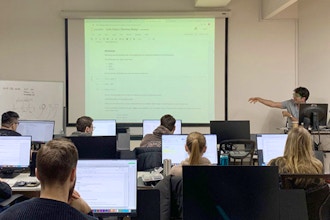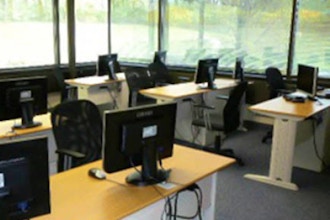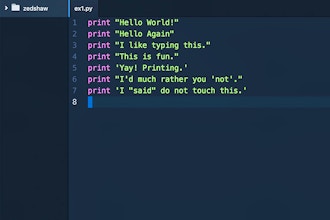Discover the Best Data Analytics Classes in Boston
The data analytics process provides a way for organizations to analyze a variety of data types, such as historical, structured, unstructured, real-time, and qualitative, to spot trends and provide insights. Data analytics helps organizations of all sizes and types, from small startups to multi-million-dollar corporations, digitally transform their organization to become more innovative when approaching challenges and decisions. Data Analysts help connect insights to actions, which enables companies to provide a more personalized customer experience, create better products, streamline operations, and improve workplace productivity across their organization.
Data analytics is a valuable skill set that can open many professional doors in Boston. When the market fluctuates and dips, organizations turn to data analysis to spot new opportunities to sell their products and services. Those who have a background in analyzing data can apply for a range of high-paying jobs, such as Big Data Engineer, Analytics Specialist, Data Analyst, and Data Analytics Consultant. Data professionals are at the forefront of the decision-making process within their organization. They play an integral role in its business decisions and in informing its future strategies. Not only is data analysis a valuable and useful skill set at the current time, but it is a career path that is expected to grow in demand as more companies see the value and benefits of studying their data.
Best Data Analytics Classes & Schools in Boston
Those who are interested in studying data analytics in Boston can find coursework through skills classes, bootcamps, and certificate programs. The following section will take a closer look at some of the current data analytics class listings in Boston, as well as the content covered in each course.
Information Science & Data Analysis - Quality & Productivity Solutions, Inc
Information Science & Data Analysis is available in Boston for those who want to learn about the vital role information science plays around the globe. Participants study data collection, analysis, classification, retrieval, manipulation, storage, protection, and dissemination. Instruction is also provided on how knowledge is used in organizations between individuals. By the completion of this class, those enrolled will be to not only understand an organization’s existing information system but replace or improve it. This program is intended for those who wish to expand their information science knowledge. This class costs $1,495. It takes three full days to complete this class.
Data Analytics Foundations - Noble Desktop
Noble Desktop’s Data Analytics Foundations provides students with hands-on training in data analytics in the virtual classroom environment. Participants begin this class by exploring the various applications of data analytics in different industries. They work with core skills like data forecasting and statistical modeling to locate trends and make data-driven decisions. This beginner-friendly class covers topics fundamental to the data analytics process, such as data distribution, inferential statistics, and descriptive statistics. Students also work with predictive and prescriptive analytics, algorithms, models, and theorems. It takes two full days to complete this program. The cost of study is $595.
General Assembly - Data Science Immersive
Data Science Immersive, provided by General Assembly, is a 12-week, intermediate-level bootcamp designed for those interested in learning a range of data analytics and data science tools and skills. This program is intended for those who have a background in math and are familiar with Python and wish to take these skills further and begin a data career. This class uses a blended learning model in which students are encouraged to develop their data skills through in-class projects, preparatory work, and guidance from a career coach. Those enrolled learn Python’s applications for data science, as well as how to work with programming tools like GitHub. Instruction is provided on working with Unix commands, Pandas, NumPy, and various web scraping tools. By the end of this bootcamp, students will have a solid understanding of natural language processing, statistical modeling, machine learning, and regression. Tuition is $16,450. This class can be completed online or in person in Boston.
Tableau 101 - Ledet Training
Those who would like to learn more about one of the most widely used tools for data analysis and visualization can enroll in Tableau 101. This beginner-friendly class provides two days of live Tableau instruction for those in Boston. Participants learn core data visualization skills, such as how to import data from disparate sources and use it to construct visualizations and stories. Instruction is provided on the Tableau interface, best practices, data analysis, workflow management, basic calculations, data breakdowns, and presentation. Tuition is $899.
Data Analytics Course - General Assembly
General Assembly’s Data Analytics Course provides beginner-friendly instruction for those who are new to data analytics. Through hands-on instruction, participants explore vital data skills that have applications across industries. This course teaches topics like data collection, cleaning, analyzing, and visualizing. Participants become familiar with industry-standard tools like SQL, Tableau, and Excel. By graduation, students will know how to gain valuable insights from data. Tuition is $4,500 for this 60-hour program. Participants can choose whether to complete this class in-person in Boston or in the live online training format.
Boston Industries That Use Data Analytics
Boston is a popular location for tourism and employment in the US. The main industries in Boston are healthcare, education, hospitality, and retail. The following sections will explore the role data analytics plays in each of these industries.
Healthcare
In Boston, the healthcare industry employs 18% of the city’s workforce. Five out of the city’s ten largest employers are hospitals. In addition, this city is home to more than 120 digital health and health IT companies. The healthcare industry creates huge amounts of data each day. Those who know how to analyze these data gain insights into how to improve patient care and general operations at healthcare facilities. Healthcare analytics plays an integral role in modern healthcare because of its noted applications for improving patient care and operational efficiency. It is used to provide comprehensive e-health records, provide healthcare providers with real-time alerts, provide insights into patients’ treatment plans, increase the speed and accuracy of disease detection, integrate data from devices like cell phones and FitBits, and reduce costs.
Education
Another large industry in Boston is education. This industry comprises nearly 8% of the city’s workforce. The city is home to some of the world’s most prestigious universities, such as Harvard and MIT. In 2022, Boston was listed for the second time in a row as the sixth-most educated city in the US. Big data analysis has a range of applications in academia. Not only does it help students receive a better education, but it also helps administrators and educators perform tasks more efficiently and effectively. Data analysis can spot areas where students are academically struggling so teachers can find strategies to personalize their learning. Educational data mining can create predictive models capable of identifying at-risk learners who are likely to drop a course. By studying student data, educators can customize curricula capable of allowing students to have an individualized approach to learning core educational content. Not only can educational content be adapted with the help of data analytics, but so too can student support. When data patterns reveal a student may not be engaged in their learning, additional support can be provided. Educational administrators also benefit from data. The data analytics process can help administrators decide how to allocate resources based on which facilities students use the most.
Hospitality
Because of how many tourists flock to Boston each year to see this city’s historic landmarks, the hospitality industry remains a huge employer. It is projected that by the end of 2023, the demand for hotel rooms in Boston will be greater than 16 million rooms per night, which is the highest number in the city’s history. To keep up with this increasing demand, those with a background in hospitality analytics are needed by many hotels. Hospitality analytics has applications for increasing a hotel’s revenue, helping its brand improve customer loyalty, and ensuring that hotels establish a market presence. Additionally, hospitality analytics can be used to gather customer feedback about their experiences at a hotel, which can then help Hotel Managers and Hoteliers provide better services. Data analytics is also useful in the hospitality industry for providing real-time analytics comparing a hotel’s pricing strategy to its competition, which can lead to increased bookings and better customer experience.
Retail
Boston continues to be one of the country’s top retail markets. Retail analytics is a valuable tool for those who work in retail. It involves studying empirical data to help retailers make more informed decisions. Analyzing data helps retailers determine appropriate inventory levels, hire the necessary number of employees, establish competitive price levels that will attract customers and generate profit, and claim market share.
Data Analytics Jobs & Salaries in Boston
A range of professions in Boston hire employees with a background in data analytics. The following sections will briefly explore some of the most popular professions for data professionals in the city, as well as the salaries for these roles.
Data Analyst
Data Analysts gather, clean, and analyze data to find the answer to a specific question or to solve a problem. These professionals also study data to spot patterns and trends that can provide an organization with a greater understanding of its customers and their needs. In Boston, those with a background in data analytics work in fields like criminal justice, finance, business, science, government, and medicine. Data Analysts in Boston make an average yearly salary of $87,000.
Data Engineer
Data Engineers create systems capable of gathering, managing, and converting data into information that a Data Scientist can then analyze. These professionals work in various settings to ensure data is accessible, and organizations can use it to study their current performance and find ways to improve operations. Boston-based Data Engineers make approximately $119,000 a year.
Security Risk Analyst
Security Risk Analysts perform various tasks to ensure an organization’s data is secure. These professionals are hired to spot potential risk and threat areas, document and define each risk and its potential impact, update IT security governance policies and procedures, perform reviews of IT teams’ policy compliance, and analyze IT security metrics to determine how effective its existing security management processes are. Security Risk Analysts in Boston earn $117,000 annually.




























